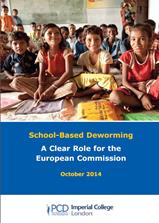
Schistosomiasis and soil-transmitted helminths (STH) are two
neglected tropical diseases (NTDs) that particularly affect school-age children’s health, education and future productivity. Over 400 million school-age children are infected by these diseases and hundreds of millions more are vulnerable to them.
Periodic drug treatment for children in schools – known as
school-based deworming – represents a highly strategic and cost-effective approach to tackling STH and schistosomiasis. Integrated programmes that deliver deworming,
water, sanitation and hygiene (WASH), health education and other key interventions which can lead to even greater long-term impact.
Progress So Far
The signing of the
London Declaration on NTDs in 2012 generated strong momentum at the global level to tackle NTDs, including schistosomiasis and STH. As a result of the London Declaration, a number of powerful partnerships (involving national governments, official donors, philanthropic foundations, the private sector and civil society) have been formed, leading to increased investment, including greater drug donations on the part of the pharmaceutical industry.
A Role for the European Commission
Despite commitments made by key stakeholders,
a new policy paper from Imperial College London's
Partnership for Child Development outlines that the
European Commission (EC) has been on the margins of the growing global movement against NTDs. And with its financial resources, technical capacity and global network, the EC could and should play a pivotal role in necessitating action against NTDs at both global and national levels.
Recommendations
Among its recommendations, the paper outlines the EC should:
- Develop a policy on NTDs that clearly recognises the threat that these diseases pose to global health, education and nutrition.
- Ensure that the control and elimination of schistosomiasis and STH are integrated into its education, nutrition and WASH strategies and programmes.
- Work with the World Health Organization and national governments to prepare and implement integrated plans for NTD control that markedly include school-based deworming programmes.
- Significantly increase funding to R&D for NTDs, in particular schistosomiasis and STH, and help national governments to address operational challenges experienced by school-based deworming programmes.
- Promote NTDs on the international stage, including in the Sustainable Development Goals agenda.

